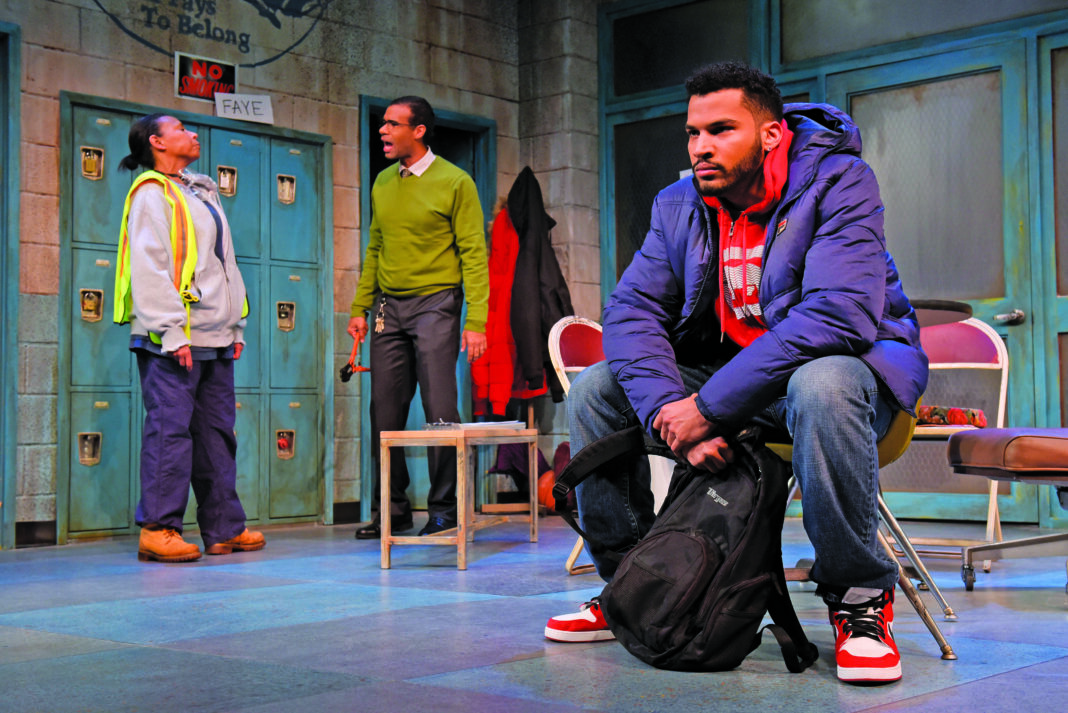Until jarring developments happen in the final few minutes of its two-hour length (more about that later), Dominique Morisseau’s Skeleton Crew, currently being given a splendid production by Marin Theatre Company (MTC), provides a gripping and insightful exposure of some of modern American capitalism’s most egregious shortcomings. In this regard, critics have hailed her as a worthy successor to Clifford Odets, Arthur Miller and August Wilson.
Morisseau’s factory floor drama has taken a while to get here. It has a Marin connection, having won MTC’s 2014 Sky Cooper New American Play Prize, but the debut production was in New York in 2016 and only now are Bay Area audiences getting their first viewing, presented in association with TheatreWorks Silicon Valley, where it will move following the local run.
Skeleton Crew is the third and final play of Morisseau’s Detroit Project, an endeavor that the author says she hopes will give her hometown some of the same attention, though on a lesser scale, that Pittsburgh received in August Wilson’s 10-play cycle. For Pittsburgh it was the decline of steel and coal that shook the city’s economic foundations, especially for minority communities; in the Motor City it was the outsourcing of car manufacturing to low-wage countries, technological advances replacing people with machines and the impact of the country’s sudden banking crisis that created a perfect storm in 2007-2008. Hundreds of thousands of workers (a large percentage of whom were African-American), whose high wages and middle-class lifestyles were the result of a long union-led struggle, were suddenly faced with an existential crisis.
Scenic designer Ed Haynes’ set, the shabby breakroom of a small auto stamping plant, perfectly captures the gloomy atmosphere that its four inhabitants—the “skeleton crew” of the title—face when they come to work every day. Its spare furnishings and ubiquitous grey coloring under warehouse-style fluorescents (designer: Steven Mannshardt) provide the only respite from a work area, where giant machines are projected between scenes on a rear scrim as shadowy silhouettes that noisily stamp and bend the resisting metal into the shape of next year’s shiny car models. The combination is repulsive, even frightening for us as we sit in our comfortable theater chairs, but a vital lifeline for those who depend on it for their monthly paychecks.
As often happens in such situations, these laborers at the tail end of America’s Industrial Age find comfort in each other, and each has a different story to tell. Shanita (Tristan Cunningham) is an unwed but very pregnant mother-to-be. Good-hearted and free-spirited, she’s a second-generation factory worker who takes adversity in stride and cheers others with her presence. Dez (Christian Thompson) is a hot-blooded young man who is trying to figure out who he is and what he wants to do with himself. Reggie (Lance Gardner) is the by-the-book unit foreman who has worked his way into that position by following orders and now, with rumors of the plant’s closing flying about, fears for the future security of his wife and children.
Finally, we come to Faye (Margo Hall). While Jade King Carroll’s direction is spot-on and all of the aforementioned actors make strong contributions, it’s Hall who supplies much of the drama’s internal energy. Recognized as being among the Bay Area’s finest performers, she lights up the stage with her ability to portray a complex human being whose 29 years on the job permits her to have an authority that even Reggie’s obsession with rules can’t ignore. She’s homeless because of an ill-advised weakness for gambling. She smokes, ignoring the health warnings and the “NO SMOKING” breakroom signs. She admits her foibles, and does the same for others as she cheerfully looks forward to the final year before she can retire with full benefits.
Sadly, that final year will never come, thanks to a last-minute Hollywood-style feel-good moral compromise that, along with an awkward romantic connection between Dez and Shanita, seems at variance with the clear-eyed realism of the play. Both are troubling, but definitely not fatal. Clearly, Skeleton Crew brands Dominique Morisseau as a playwright to watch.
NOW PLAYING: Skeleton Crew runs through February 18 at Marin Theatre Company, 397 Miller Ave., Mill Valley; 415/388-5208; marintheatre.org.









